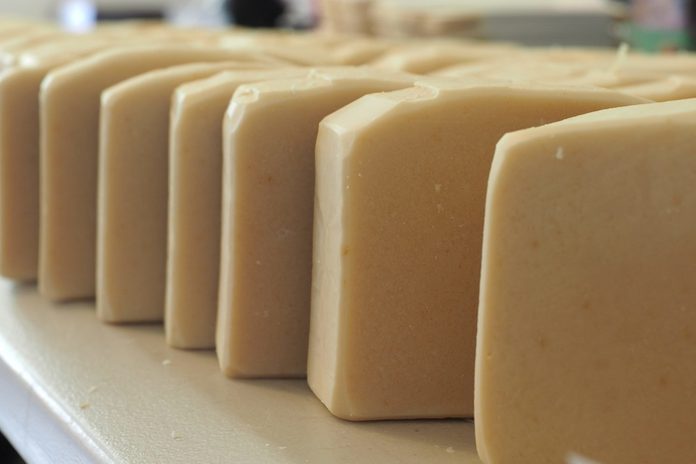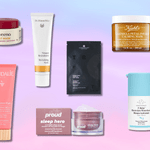Is Goat Milk Soap Good for Your Skin?

Goat milk soap does have benefits. It can help soothe irritated, sensitive skin and may help reduce symptoms of eczema and psoriasis—but it's not for everyone. Here's what you need to know.
If you have dry, irritated, sensitive skin, or if you suffer from eczema or psoriasis, then you know what a struggle it can be to find a soap that doesn’t aggravate your skin. The answer to your skin care woes may not come from a lab but from a farm animal: goats.
Jim and PJ Jonas, goat farmers in Indiana, discovered the benefits of goat milk soap in a very personal way. Jim lived for years with painful, cracked skin on his fingertips, and he found that putting goat milk soap on his hands kept them from splitting open. PJ had started making homemade soap as a way to avoid using chemical-laden cleansers on their eight children, but Jim had begun using it as well.
The results were so life-changing that the couple decided to share the products with others, eventually starting their own business, Goat Milk Stuff, selling goat milk soap and other skin care products made from goat milk.
(Related: What to Know About Peptides in Skin Care)
The potential skin benefits of goat milk soap
At a local farmer’s market, customers told PJ about how they struggled with eczema on their children’s skin, even going so far as to tape gloves over little ones’ hands to keep them from scratching. “And the most amazing thing was happening: Our soap was relieving their eczema symptoms,” PJ says. Experiences like this have made goat milk soap a holy grail in skin care for people with sensitive skin conditions.
This makes sense, as it is more hydrating and soothing than other types of cleansers and is less likely to cause a reaction, says Stacy Chimento, MD, a board-certified dermatologist at Riverchase Dermatology in Miami.
So, what exactly is goat milk soap?
Goat milk soap is exactly what it sounds like: a soap bar or cake made primarily from raw goat milk. It may also include alpha-hydroxy acids (AHAs), sodium hydroxide, and a type of natural fat, like coconut oil, shea butter, jojoba, or other oil. Glycerin and beeswax are popular natural stabilizers. Scented varieties generally include essential oils and/or plant material, like lavender flowers or lemon balm.
Most goat milk soaps are specifically formulated to not include artificial colors or scents, or synthetic detergents, which can aggravate sensitive skin. However, there are many different brands and formulations, so be sure to check the ingredient list before buying.
Goat milk soap is quickly becoming one of the most popular types of traditional soap, according to an analysis done by Research and Markets, a market research company. Goat milk has a natural neutral pH and lactic acid, which combined with its high fat content makes it perfect for many skin care products, including soap.
(Related: Could Psychodermatology Be the Key to Healthier Skin?)
Is it “real” soap?
It may surprise you to discover that the bottle of “soap” next to your sink probably isn’t soap at all. Chances are, it’s a synthetic detergent. According to the Food and Drug Administration (FDA), true soap must combine fats or oils with an alkali, such as lye. The most popular “soaps” on the market are made from synthetic ingredients so they don’t actually meet the definition of soap. Not sure which type your cleanser is? If it foams or produces lots of suds, it’s likely synthetic.
While synthetic detergents aren’t bad for you and do work, more and more people are choosing to buy traditional soap as a way to avoid chemicals, protect the environment, and support local businesses. Enthusiasts also swear that traditional soaps, like goat milk soap, work better and feel better on their skin.
Benefits of goat milk soap
Goat milk soap has gained popularity in the last few years for its all-natural ingredients and unique ability to soothe irritated skin. Here’s why proponents say it’s a good skin care choice.
It may be less allergenic
The fewer the ingredients, the less likely it is that something will provoke an allergic reaction on your skin, says Dr. Chimento. Goat milk soap only has a handful of ingredients other than goat milk. “In comparison to other soaps formulated with harmful or drying chemicals that are harsh on the skin, goat milk soap is far less irritating and more hypoallergenic,” she says.
(Related: The Best Thing to Do for Your Skin in Lockdown)
It cleans and moisturizes
Many soaps are very drying. Goat milk soap, however, is made with full cream instead of water, which makes it work like a moisturizer and a cleanser. “This kind of soap is incredibly nourishing for the skin, as the fat content locks in moisture and does not strip skin of its natural oils,” Dr. Chimento says.
It may help some skin conditions
Message boards for psoriasis and eczema are full of people who swear by goat milk soap to soothe and heal their skin. This is because it helps the skin repair its lipid barrier, the layer of fat on the surface of the skin that keeps moisture in and irritants out, giving skin a chance to repair and heal, says Dr. Chimento.
It’s a natural exfoliant
Since goat soap contains lactic acid, it is a natural way to exfoliate skin both on the face and body. “Lactic acid sloughs off dead skin cells and leaves the pores tighter and skin smoother,” Dr. Chimento says.
It may help reduce signs of aging
Goat’s milk also contains vitamin A, which has been shown to reduce signs of aging, like wrinkles and deep lines, when applied to the skin, says Dr. Chimento. Vitamin A is the powerhouse behind the anti-aging heavyweight retinol, though don’t expect the same level of results from goat milk soap.
It gives your skin a dose of vitamins
Goat milk soap is rich in B vitamins and trace minerals, like magnesium and potassium. “Water-based soaps can be artificially fortified with vitamins, but most aren’t,” Dr. Chimento explains. “And the alpha-hydroxy acids in goat milk help the vitamins and minerals to be absorbed into the deeper layers of your skin.”
(Related: How to Find the Right Vitamin C Serum for You)
What to know before you buy
While goat milk soap’s nourishing properties suggest possible skin-boosting benefits, a lack of scientific research on it makes it hard to say whether it is really effective. Right now, benefits mostly come from anecdotal reports.
Moreover, it’s hard to know how much goat milk is in a given product. Considering goat milk is the ingredient with the potential skin-boosting benefits, it’s tough to tell how effective a product will be. The quality and sourcing of the goat milk are important, and unfortunately, not all products are the same.
Who shouldn’t try goat milk soap?
Goat milk soap is one of the most gentle cleansers on the market, but it isn’t necessarily for everyone. “Goat’s milk is still a form of dairy, so it is advised to pay attention to how your skin reacts when using it as a soap,” says Dr. Chimento. It is possible that goat’s milk can cause an allergic reaction in some people who are hypersensitive to dairy products. If that’s you, make sure you know these dairy myths and facts.
Fragrances, herbs, and essential oils can cause reactions in people sensitive to that type of plant, she adds. If you have psoriasis, eczema, or highly reactive skin, use pure goat milk soap with no extra additives for color or scent.
Lastly, people who have naturally oily skin or severe acne may want to steer clear, as goat milk soap’s high fat content can cause excess sebum and clog pores, Dr. Chimento says. “If you are experiencing any uncomfortable or painful side effects after using goat milk soap, make an appointment with a dermatologist to be given a personalized diagnosis and treatment plan,” she says.
Now that you know about goat milk soap, here’s what you need to know about scalp care, the latest trend in skincare.




